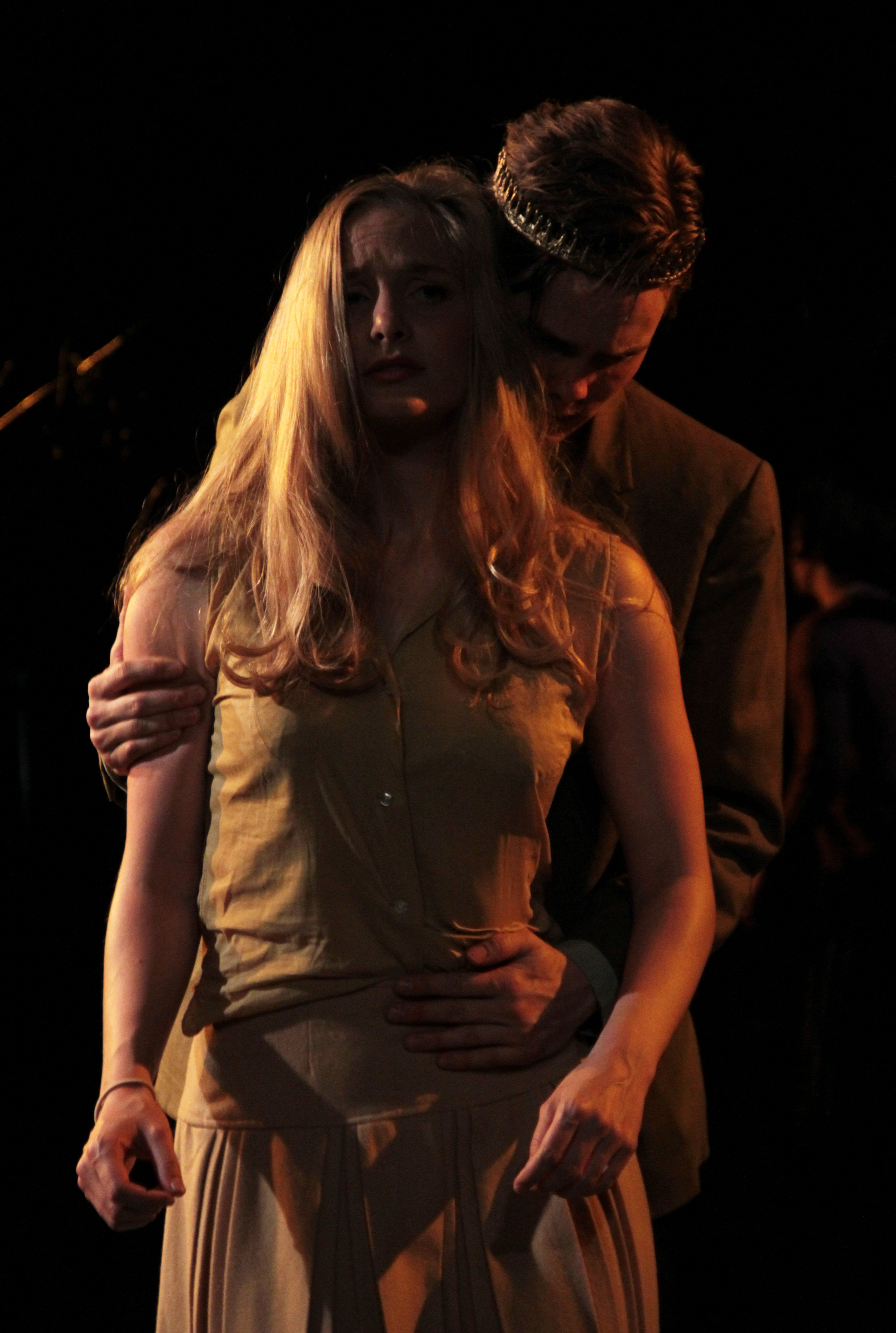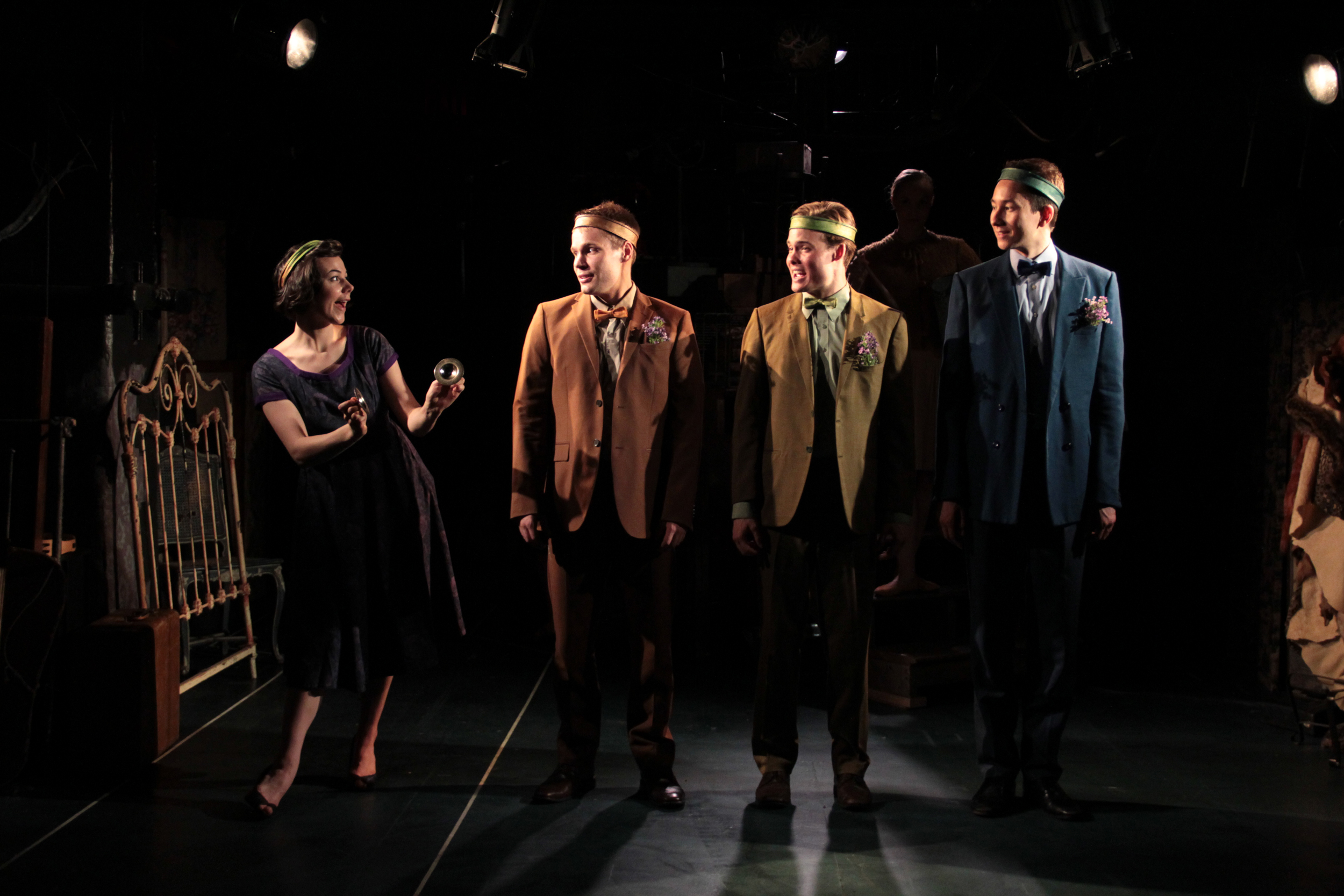According to Mary Zimmerman, author of The Secret in the Wings, the setting for the play is “some strange place balanced between a basement and a forest.” The Yale Cabaret, in other words. The Secret in the Wings is now showing in repertory as part of The Yale Summer Cabaret’s 50 Nights: A Festival of Stories, and is the kind of show the intimate acting space thrives on. The Cab’s basement space has been revamped, by Adam Rigg and Solomon Weisbard, as a cluttered and creepily-lit set looking like the kind of basement kids would enter on a dare, and, with chalk drawings of trees all about, it’s also the kind of forest kids playacting in a basement might create. With the audience seated at tables hugging the periphery, a talented cast of six—three males and three females—conjure up a sequence of fairy tales told, in the best Grimm Brothers tradition, without sparing us their violence, grotesque oddities, and fantastic variants of the eternal “find a mate and please your parents” agenda that children have been tasked with since feudal times.
It all begins—well, “once upon a time” there was a little girl named Alex (Alex Trow) whose parents (Ethan Heard and Monique Barbee), being somewhat preening and capricious, chose to leave her for the evening in the care of creepy Mr. Fitzbania (Josiah Bania), a neighbor with a garden of roses, a surly demeanor, and, according to the anxious Alex, a tail! Indeed he does have a tail, several tales, in fact, and the play consists of the stories he regales the girl with, preceded by his simple question, “will you marry me?”
Beauty and the Beast, right? Yes, and all the tales have both beauty and beastliness, the latter generally attended with a certain sportive sense of the comical: sure, the unsuccessful suitors for “The Princess Who Would Not Laugh” (Hannah Sorenson, kind of channeling Winona Ryder in Heathers) are decapitated, but the basketballs that roll onto the set as their hapless heads are pretty amusing. As is the little vaudeville routine the three fellas in "Three Blind Queens" enact with gusto as the everyday life of three princes. When an evil Nursemaid (Sorenson again—she does evil well, if you saw her as Tamora you know what I mean) demands that the three queens the guys marry have their eyes gouged out (while the princes are away at war), we get a jar of marbles.
At times the props become more poetic—as for instance the little stacks of twigs for the blinded queens’ children—and the choreography even more so: the repetitive routine by which six sons transform into swans and back, due to their piqued father’s unthinking curse, is a bit like watching someone become a bird automaton. Mickey Theis (as “the worst” son, according to his father), has to do this solo in a corner the way a bad child would, with a look of transfixed wonder and horror mixed. And Bania does a nice turn as the dad, a simple man driven to his wit's end by his noisy sons.
Each tale Mr. Fitzbania reads is left unfinished as he moves on to another, letting these tales of dark doings hang suspended, until we get to The Swan Sons and a sort of entr’acte tale about a dinner party, a ghostly visitor (Trow—who has a flair for wide-eyed ingenue parts) and two coins. Then we get, fairly rapidly, the outcomes of the tales.
The story I liked best is sung by the whole cast, and the lyric of the madrigal-like song—“where are you going my one true love, never go there without me”—suits perfectly this tale about the possibilities of love after death. This time Trow gets to be not so nice, and Ethan Heard, as the lover who agrees to be entombed, alive, with his beloved goes through it all with stoic grace.
Prospects for necrophilia not macabre enough for you? How about incest in the tale of Allerleira, a beautiful blonde (Sorenson of course) whose dad (Theis) wants to wed her since no other woman in the kingdom can match the beauty of her deceased mom? This story incorporates fun devices such as a hopscotch jingle that says it all, and a bit in which three kids (Heard, the leader, Trow, the minx, and Barbee, the flighty one) try to get the story straight. It’s an entertaining glimpse of how children take in and make sense of the kinds of odd things adults tell them in books.
And what is Zimmerman telling us? The upshot of it all seems to be something like Bruno Bettelheim’s “the uses of enchantment” argument: the tales we tell—and the odder the better—create our capacity for imagination and allow kids to work through the eternal mysteries of life, such as “what’s up with mom and dad?” and “how do I find love?”
Director Margot Bordelon shows that the great pleasure of Zimmerman’s piecemeal reworking of old themes is to be found in the rapid staging and each cast member’s seemingly impromptu changes, and that its value will be revealed in glimpses of beauty and mystery that surprise us. The whole evening seems not too far removed from what gifted children might get up to in a basement, working through bewilderment and angst via the magic of make-believe.
The Secret in the Wings is that, no matter how happily ever after the story ends, something is always left hanging—and what you do with that, my child, is up to you.
Yale Summer Cabaret
50 Nights: A Festival of Stories
June 20-August 19, 2012
The Yale Cabaret
The Secret in the Wings by Mary Zimmerman
Directed by Margot Bordelon
Cast: Josiah Bania, Monique Barbee, Ethan Heard, Hannah Sorenson, Mickey Theis, Alex Trow
Adam Rigg: Sets; Maria Hooper: Costumes; Solomon Weisbard: Lighting; Matt Otto: Sound
July: 21st, 8pm; 22nd, 8pm; 25th, 8pm; 28th, 2pm August: 3rd, 8pm; 4th, 2pm; 9th, 8pm; 11th, 8pm; 15th, 8pm; 19th, 8pm
50 Nights: A Festival of Stories:
Tanya Dean, Artistic Director; Reynaldi Lolong, Producer; Eric Gershman, Associate Producer; Shane Hudson, Associate Producer; Dana Tanner-Kennedy, Associate Artistic Director/Resident Dramaturg; Jacqueline Deniz Young, Production Manager/Technical Director; Alyssa K. Howard, Production Stage Manager; Rob Chikar, Stage Manager


